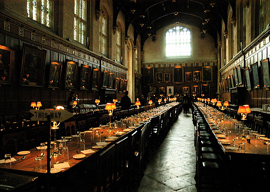
April 19, 2011

Arrayed against them were the aforementioned Ahir Shah, Count Nikolai Tolstoy, Viscount Monckton of Brenchley, and your faithful correspondent.
I was seated next to both Ms. Christian and Mr. Smith at the pre-debate dinner. Although Union protocol calls for black tie, Mr. Smith was in a gray suit and Mr. Freda was more casually dressed”doubtless in deference to the highly debatable dogma that democracy requires bad manners. Mr. Smith sported a lapel pin depicting a blue St. Andrew’s Cross on a red field”somewhat reminiscent of the Confederate battle flag, a comparison he was quick to reject. It took a bit of doing, but a few jokes eventually elicited my dinner-mates” laughter. Republicanism apparently does little for the sense of humor.
So it proved during the debate. Although a monarchist himself, young Mr. Freeland showed great ability in stating the proposers” rather moldy case: Monarchy is undemocratic, it bars equality and meritocracy, and so on. Count Tolstoy rose to present our case, observing that most good things”such as family”are hereditary. Moreover, while the heir may not be suitable, elections can bring you much worse, such as Hitler. To this Ms. Christian interjected, “So you like Hitler!” which led to collegiate catcalls. The Count finished and the lawyer rose, declaring in great detail that monarchy leads inevitably to cronyism. All the evils she decried sounded far more like the White House or Downing Street than Buckingham Palace.
Viscount Monckton began by announcing that the republicans were indeed a gray, humorless lot: “They don”t even believe what they say themselves!” In his ten minutes, the Peer of the Realm spared them little. In response, Graham Smith denounced politicians” rule under the Royal Prerogative’s mantle and claimed that direct elections would free the public of these parasites. Then followed the floor speeches, in which audience members offered their opinions. Most were monarchist, although the noted barrister and activist James Bogle claimed that republics are better than monarchies because republican revolutions provide enormous employment for undertakers.
Mr. Freda maintained that a republic was best because it inspired people to look to themselves rather than royalty; that royalty was ill-prepared for its job, as shown by Prince William’s indulging in a Nazi salute (although the crowd heartily corrected this error, he repeated it three times, roared at accordingly with each utterance); and that fairy tales were bad, because they encourage fantasy (this did not go over well in the Inklings” hometown).
Your correspondent pointed out that the democracy, equality, and meritocracy the republicans called for exist nowhere on Earth, least of all in republics; that monarchies are never replaced by better regimes, and that is particularly true in the Commonwealth; and he invited his audience to speculate that a Republic of England would be a bleak place indeed.
The proposition was defeated two to one, and for this year, Oxford was saved for the Crown. It was Cavaliers versus Roundheads all over again. The republic side quickly withdrew from the after-drinks, while the monarchists celebrated with their hosts into the wee hours. When this writer at last crawled into his bed, he felt some confidence that he had done his duty to the city where King Charles the First made his headquarters and some of his favorite authors wrote and drank.